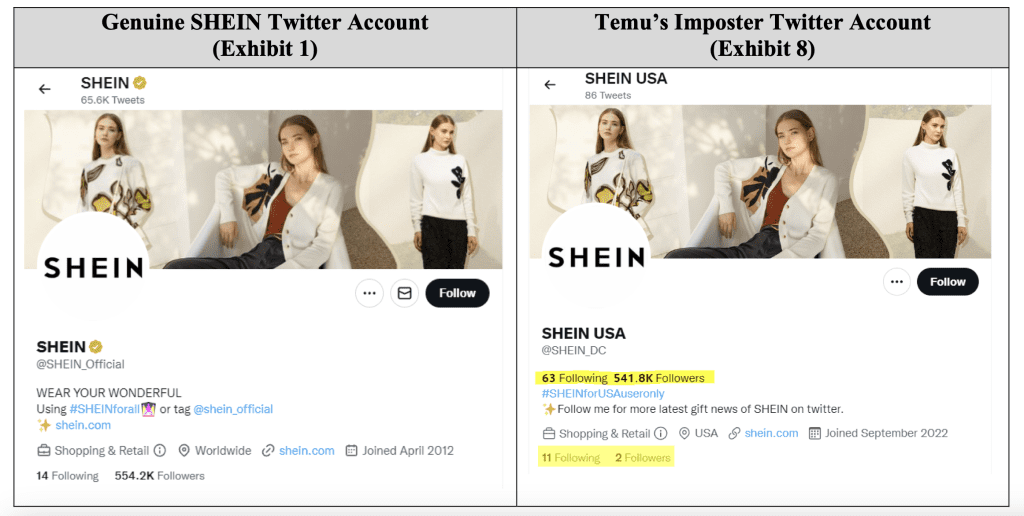A battle between two Chinese ultra-fast fashion companies is heating up in court in the U.S. According to the amended complaint that Roadget Business Pte. Ltd., the owner of SHEIN’s trademarks in the U.S., filed with the U.S. District Court for the Northern District of Illinois early this month, marketplace platform Temu – via its owner PDD Holdings Inc. and WhaleCo, Inc. and – has “willfully and flagrantly infringed SHEIN’s exclusive and valuable trademark and copyright rights,” and engaged in a scheme to boost its own growth in the American market by “impersonating [the] SHEIN brand on social media, trading off of the well-known SHEIN trademarks, and using copyrighted images owned by Roadget as part of [its own] product listings.”
Setting the stage in an amended complaint, in which it sets out claims of trademark counterfeiting, trademark dilution, and copyright infringement, among others, Roadget asserts that the popularity of its SHEIN brand among consumers in the U.S. “has skyrocketed in the last several years,” and its trademarks are “now associated with one of the most popular online fashion and lifestyle retailers in the world.” (For some perspective: Roadget states that in May 2021, the SHEIN mobile app became the most downloaded shopping app in the U.S., and in May 2022, it became the most downloaded mobile app in the U.S. in any category, outperforming both TikTok and Instagram.)
“A significant component” of the success of the SHEIN brand has been the “investment in building brand recognition,” including by partnering with “thousands of influencers, celebrities, fashion bloggers and contestants on reality shows, and start[ing] viral trends.” To protect its brand, Roadget states that it has registered an array of SHEIN-specific trademarks in the U.S. and maintains a number of copyright registrations for brand-related imagery.
Aware of the well-known SHEIN brand and its success in the U.S. market, Roadget alleges that PDD Holdings-owned Temu launched its U.S. online shopping site on September 1, 2022. However, instead of “fairly competing” with SHEIN “by, for example, offering comparable products at a lower price or by offering a more diverse array of products for selection and purchase by consumers,” Roadget claims that Temu has “deliberately engag[ed] in unfair competition by exploiting the SHEIN brand.” And the similarity of the two companies and their models has not been lost on the media, with Roadget stating that “multiple independent publications [have] compared Temu to SHEIN and one even called Temu ‘a SHEIN imitator.’”
With its alleged aim of “divert[ing] consumers and business away” from purchasing SHEIN-branded goods in favor of its own apparel and accessories offerings, Roadget claims that Temu has “embarked on a deliberate scheme of impersonating, or aiding and abetting the impersonation of, SHEIN.” In particular, Roadget alleges that Temu has established and used “imposter” Twitter accounts that contained SHEIN trademarks in the handles (@SHEIN_DC, @SHEIN_USA_, and @SHEIN_NYC), included links to authentic SHEIN web domains, and used “the same profile icons and profile photos in [its] imposter Twitter accounts as the genuine SHEIN Twitter account.”

Using these accounts, Temu has “deceive[d] consumers into downloading its app by embedding innocuous links” into tweets that only display SHEIN trademarks, Roadget contends. “Those posts, which do not have any Temu branding, direct consumers to ‘Download APP from link,’” but instead of enabling consumers to download the SHEIN app, the links “directed them to Temu’s website to download the Temu app.” In doing so, Roadget claims that Temu “trade[d] off the recognition and goodwill of the SHEIN marks in order to capture the attention of actual and potential customers of SHEIN-branded goods, and to divert those people into becoming Temu customers.”
Roadget, which filed its initial complaint in December, alleges that Temu went even further and “used and continues to use [SHEIN’s] copyrighted images … in connection with the sale and distribution of goods on Temu’s website,” thereby, infringing its copyrights.
Not finished there, Roadget claims that Temu has sought to win over consumers in the U.S. by “disseminating false and deceptive statements regarding SHEIN products to influencers and inducing them to make such statements in connection with the promotion of Temu’s goods and services to their followers in exchange for monetary payments.” For instance, Roadget asserts that Temu is providing influencers with “social media guidelines,” including specific statements to post, such as, “Shein is not the only cheap option for clothing! Check Temu.com out, cheaper and way better quality,” and “Looking for clothes better than Shein but cheaper than revolve? Check Temu.com out.” These statements are “false and misleading,” per Roadget, which says that it has been harmed as a result of such influencer campaigns.

And finally, Roadget points to “advertisements on Google in the U.S. (and worldwide) that use the SHEIN trademarks deceptively to promote the Temu website,” and that are likely to confuse consumers “into believing that Temu is SHEIN, is associated with the SHEIN brand, or that SHEIN-branded products are offered for sale through the Temu website.”
With the foregoing in mind, Roadget lodges trademark counterfeiting and infringement, trademark dilution, and copyright infringement, false designation of origin and unfair competition, contributory false advertising, copyright infringement, trademark dilution, deceptive trade practices, product disparagement and trade libel, and unjust enrichment claims, and is seeking injunctive relief and monetary damages.
Temu has pushed back against Roadget’s allegations, filing a partial motion to dismiss last month, in which took issue with Roadget’s copyright claims (on the basis that some of the allegedly infringed images are not registered, a prerequisite to bringing infringement claims in federal court), as well as its false advertising and trade libel claims. In that filing, Temu asserts that it “never impersonated SHEIN and played no part in the creation of said Twitter accounts,” and instead, believes the accounts were created by “third-parties gaming Temu’s affiliate program, an initiative rewarding users who refer at least five new customers to download Temu.” Such activity “violates [its] Terms of Use and Cash Reward Referral Program Official Rules,” Temu alleges.
Additionally, Temu states that SHEIN “merely alleges the existence of a social media campaign that gives influencers free products to promote through social media. There is nothing actionable about Temu finding influencers who believe Temu compares favorably to SHEIN, or asking them to share those opinions with a headline clearly highlighting their enthusiasm about Temu.”
More recently, Temu asserted in an opposition to Roadget’s motion for a preliminary injunction that SHEIN is seeking relief in connection with events that are either “entirely lawful” and that SHEIN, itself, engages in (including bidding on competitors’ names for Google Ads) or events that “Temu was not responsible for” and/or has already stopped. Specifically, Temu asserts that it did not create the three fake Twitter accounts and “did not induce others to create them.” Instead, the URL links make it “clear” that they “were created by someone attempting to game Temu’s referral programs,” and Temu claims that it did not benefit from these posts or accounts. “Twitter deactivated these accounts months ago” and the accounts results in “de minimus traffic [for Temu] and only a single U.S. download.”
Reflecting on Roadget’s case more broadly, Temu alleges that it has “no purpose other than to distract Temu as it launches a competing service,” and its larger rival’s quest for a preliminary injunction here “only serves to stigmatize, shackle, and distract a new competitor.”
THE BIGGER PICTURE: The case comes amid an effort by SHEIN – which is no stranger to infringement litigation (although it usually occupies the defendant role) – to double-down on the U.S. market, where it has overtaken competitor brands like H&M, Fashion Nova, Forever 21, and Zara both in amassing revenue and market share since the outset of the COVID-19 pandemic, per Bloomberg data. The Chinese titan, which is reportedly slated to raise around $2 billion in new funding this month ahead of a U.S. stock market debut later in 2023, saw its market share in the U.S. grow by more than 50 percent between March 2020 and March 2022, per Statista, going from approximately 18 percent to 40 percent. Both SHEIN and Temu appear to be targeting a new pool of price-conscious customers (namely, Gen-Zers) that are looking for consistent novelty when it comes to their wardrobes and ultra-low prices.
Temu is threatening to encroach on SHEIN’s turf in the U.S., making headlines last month when it ran a 30-second “Shop Like A Billionaire” commercial twice during the Super Bowl, a move that reportedly cost it $14 million, and garnered it attention as a potential disruptor worth keeping an eye on.
Against this background and given the sheer size of the fast fashion market in the U.S. (which is expected to reach $133 billion by 2026), the mounting legal clash appears to be a direct byproduct of the digitally-native companies’ competing aims at cracking the U.S. market.
A spokesperson for Temu told TFL, “Temu is committed to protecting everyone’s intellectual property rights and has a strict policy against any listing that violates any third party’s IP rights. Since inception, Temu has been named as defendant in only one lawsuit alleging intellectual property infringement, which Temu strongly and categorically rejects all allegations and is vigorously defending its rights. Coincidentally, this [is the] only case [that has been] brought by SHEIN, which has been named as [a] defendant in more than 70 intellectual property infringement cases by international rights holders and independent artists since 2019.”
UPDATED (Mar. 17, 2023): This article was updated to reflect the ownership of Temu by PDD Holdings Inc., which also owns Chinese app Pinduoduo, and to include a statement from a spokesperson for Temu.
The case is Roadget Business PTE. Ltd. v. Whaleco, Inc., 1:22-cv-07119 (N.D. Ill.)











